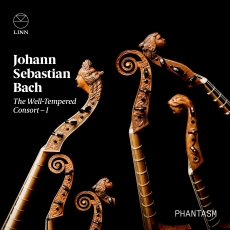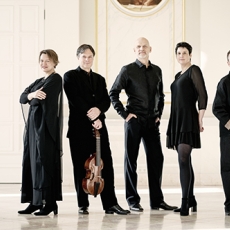Phantasm - J.S. Bach: The Well-Tempered Consort – I - Gramophone
This wonderful disc transports the counterpoint of Johann Sebastian
Bach from the solitary universe of the keyboardist's fingertips - and occasionally feet - to the convivial conversation of the 16th-century English home. Drawing chiefly on the two books of The Well Tempered Clavier, the Musical Offering and the Clavier-Übung III, the viol consort Phantasm breathe into well-known Bach a breath of newborn liveliness.
It is now, thankfully, a well-eroded cliché that a Bach fugue is a cerebral, neutral exercise. Yet these performances by Phantasm find conversation, play and dance in the unlikeliest of contrapuntal moments. What, essentially, is most fantastic about this disc is that we are listening to six players - Phantasm are joined by the spectacular bass viol sonority of guest Liam Byrne for the works in six voices - each with their own body and instrument, and therefore unique timbre and artistry, playing music that is usually only played by a single person. As such, there are a few more hand-waving, flag-waving entries that burst through the texture in shimmering inégale than we are used to in traditional recordings of 'solo Bach'. It's thrilling. Phantasm unfailingly occupy a sweet spot of individual voices in psychic attunement. In other words, Bach's imitative forms are infused with the inimitability of human nature as well as the equally human endeavour to be one. We hear both generous, marital blend as well as the fragile variation and asymmetry of human interaction.
Indeed, joy emerges in the moments when things are 'not so perfect'. Rather than the contrapuntal texture being controlled by the eight fingers and two thumbs of an omniscient single brain, there is gloriousness in the smudging of decisions, the flash of neurons to alter one's course according to the musical persuasion of others. Phantasm present us with the realness of human existence: we hear opinion, persuasion, sometimes provocation. A submediant chord (apologies to those whose music theory is increasingly hazy), for instance, manifests not as a unified structural decision but rather as one individual's chosen moment to provoke others. The boundless dynamism of the C major Fugue from BWV547 is one highlight among many. The music accumulates in energy and builds in tension until what can only be described as the most sensational squeeze, which then explodes in sparks and ribbons of diatonicism.
The conversational textures, however, aren't always so successful. The Prelude No 22 from BWV891 becomes somewhat cluttered and frantic (particularly after the profound depth of the Aus tiefer Not arrangement). Indeed, the album is indebted to these tracks of slower-moving organ music. The arrangement of Vater unser im Himmelreich, BWV737, is sumptuous: music that you can swim in, textures that coax the eardrums like the thick black water of the North Sea. I look forward to 'The Well-Tempered Consort, Vol 2'.

